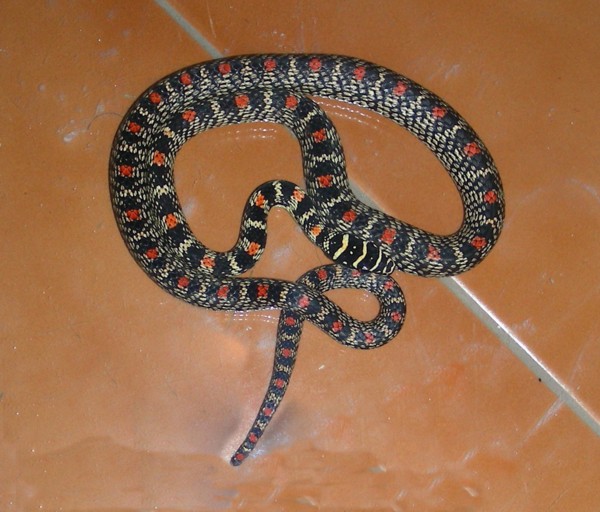|
| Query: Chrysopelea paradisi | Result: 8th of 8 | |
Ornate Flying Snake (Chrysopelea ornata) - Wiki
| Subject: | Ornate Flying Snake (Chrysopelea ornata) - Wiki
| |

| Resolution: 600x512
File Size: 82492 Bytes
Upload Date: 2007:09:01 17:14:40
|
Chrysopelea ornata
From Wikipedia, the free encyclopedia
[Photo] Ornate gliding snake Chrysopelea ornata Family Colubridae, Serpentes. Image taken in Binnaguri, North Bengal, India on 27 August 2007. Photo by Ash Lin http://commons.wikimedia.org/wiki/User:AshLin
The Ornate Flying Snake or Golden Flying Snake (Chrysopelea ornata) is a species of rear-fanged, gliding, colubrid snake found in South Asia and Southeast Asia.
Description
The ornate flying snake is usually green in color, with black cross-hatching and yellow or gold colored accents. The difference between subspecies is minimal, and largely determined by geographic locality. They are thin bodied, and rarely exceed 40 inches in length, with a flattened head and a blunt nose.
Behavior
Ornate flying snakes are diurnal, arboreal snakes. Their gliding ability, while not as impressive as that of the Paradise Flying Snake (C. paradisi), still makes them capable of moving from tree to tree with relative ease. They are excellent climbers, being able move across even the smallest of branches and even strait up trees with next to no branches by using the edges of rough bark. They tend to be nervous, fast moving snakes, and will attempt to flee if disturbed, but will not generally hesitate to bite if handled. They are mildly venomous, but the venom is not considered to be dangerous to humans. It is intended to assist in subduing fast moving, arboreal prey, like lizards and small rodents.
In captivity
In recent years, ornate flying snakes have become increasingly available in the exotic pet trade, many exported from Vietnam and neighboring countries. Instances of captive breeding are virtually unknown. Due to the species' nervous temperament and difficulty to adjusting to captivity, they tend to make poor captives for all but the most experienced reptile keepers. Many imported specimens have heavy parasite loads, and the stress of captivity all too often leads to a quick death.
Distribution
India (Western Ghats, Northeast India, Sri Lanka, Myanmar, Thailand, western Malaysia, Laos, Cambodia, Vietnam, China (Hong Kong, Hainan, Yunnan), Indonesia (Sumatra, Java, Borneo, Sulawesi), and the Philippines.
Subspecies
There are three recognized subspecies of C. ornata:
Chrysopelea ornata ornata (Shaw, 1802)
Chrysopelea ornata ornatissima (Werner, 1925)
Chrysopelea ornata sinhaleya (Deraniyagala, 1945)
http://en.wikipedia.org/wiki/Chrysopelea_ornata
| The text in this page is based on the copyrighted Wikipedia article shown in above URL. It is used under the GNU Free Documentation License. You may redistribute it, verbatim or modified, providing that you comply with the terms of the GFDL. |
|
Comments |
|---|
| | Guest |
|
| err wat am i supposed to do |
^o^
Animal Pictures Archive for smart phones
^o^
|
|
|